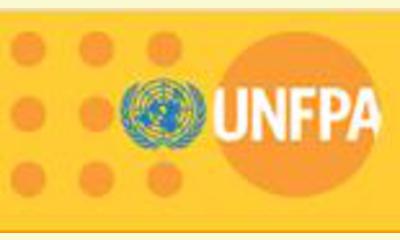|
|
New United Nations Initiative to Boost Family Planning Services for Countries in Transition
an article by United Nations Population Fund (abridged)
A new level of partnership that will bring a
significant boost in investment to family planning
services in 13 countries, with a focus on
vulnerable groups, particularly in areas affected
by natural disasters and conflict, was launched by
UNFPA, the United Nations Population Fund and the
International Planned Parenthood Federation (IPPF)
today at Women Deliver.

click on photo to enlarge
The initiative will contribute to filling the gap in
health care infrastructure, boosting the quality of
the health workforce, developing efficient family
planning distribution systems and ensuring
affordable family planning supplies.
"Family planning has been at the heart of UNFPA's
work for more than 40 years, and partnerships like
this are key to ensuring that hard-to-reach and
under-served populations, particularly women,
girls and young people, get access to the
reproductive health they need," said UNFPA
Executive Director, Dr. Babatunde Osotimehin. "We
welcome this initiative and value our longstanding
partnership with IPPF, considering its support for
family planning and its substantial service
delivery capacity."
The combination of IPPF’s experience of service
delivery and UNFPA’s strong country presence will
help address the unmet need for voluntary
contraception and increase political and financial
support for voluntary family planning and sexual
and reproductive health services at the national
level.
The partnership, which will also ensure that
innovative strategies are included and funded by
national plans, is being fine-tuned with
information collected during assessments carried
out throughout the year. Such assessments have so
far been completed in Côte d'Ivoire, Ethiopia,
Kenya, Liberia, Nigeria and South Sudan.
IPPF’s Director General, Tewodros Melesse, said:
“Our two organizations have worked together over
many years, and I’m proud that we can have a key
joint role as we work towards the FP2020 goals.
There cannot be meaningful development without
sexual and reproductive health and rights—we’re
the largest NGO dealing with these issues on the
ground” . . .
As part of the initiative, seven IPPF Member
Associations will work in close collaboration with
UNFPA to provide around 2 million family planning
services by 2013, with plans to increase that to
25 million by 2015. Young people are expected to
constitute about 30 per cent of the beneficiaries.
. .
Cultural barriers make it more difficult for women
and unmarried individuals to seek and access the
family planning services they need. Through this
new collaboration, UNFPA and IPPF are using their
combined experience to reach these individuals and
couples.
In Côte d'Ivoire, 60 per cent of women who wish to
delay or avoid a pregnancy are not using modern
methods of contraception. Only 36 per cent of the
country’s health facilities offer a choice of
modern contraceptive methods. The adolescent
girls’ birth rate has increased from 111/1,000 in
2005 to 129/1,000 in 2012. . .
[Note: Thank you to Janet Hudgins, the CPNN reporter
for this article.]
|








|
DISCUSSION
Question(s) related to this article:
What other resources can be utilized to give women more opportunities?,
* * * * *
LATEST READER COMMENT:
On their website, the United Nations Population Fund makes it clear that lack of access to family planning is a form of violence against women.
"Gender-based violence both reflects and reinforces inequities between men and women and compromises the health, dignity, security and autonomy of its victims. It encompasses a wide range of human rights violations, including sexual abuse of children, rape, domestic violence, sexual assault and harassment, trafficking of women and girls and several harmful traditional practices. Any one of these abuses can leave deep psychological scars, damage the health of women and girls in general, including their reproductive and sexual health, and in some instances, results in death.
Violence against women has been called "the most pervasive yet least recognized human rights abuse in the world." Accordingly, the Vienna Human Rights Conference and the Fourth World Conference on Women gave priority to this issue, which jeopardizes women's lives, bodies, psychological integrity and freedom. Violence may have profound effects – direct and indirect – on a woman's reproductive health, including:
Unwanted pregnancies and restricted access to family planning information and contraceptives
Unsafe abortion or injuries sustained during a legal abortion after an unwanted pregnancy
Complications from frequent, high-risk pregnancies and lack of follow-up care
Sexually transmitted infections, including HIV
Persistent gynaecological problems
Psychological problems
Gender-based violence also serves – by intention or effect – to perpetuate male power and control. It is sustained by a culture of silence and denial of the seriousness of the health consequences of abuse. In addition to the harm they exact on the individual level, these consequences also exact a social toll and place a heavy and unnecessary burden on health services.
UNFPA recognizes that violence against women is inextricably linked to gender-based inequalities. When women and girls are expected to be generally subservient, their behaviour in relation to their health, including reproductive health, is negatively affected at all stages of the life cycle.
UNFPA puts every effort into breaking the silence and ensuring that the voices of women are heard. At the same time, the Fund works to change the paradigm of masculinity that allows for the resolution of conflict through violence. . ...more.

|
|









